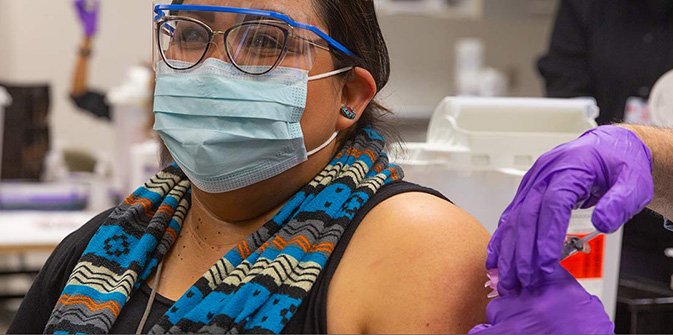Preparing for Disaster: UNM Hospital Participates in Region-Wide Emergency Training

Vax to the Max
Eight Things to Know About COVID-19 Booster Shots
The recent discussion and governmental approvals of a third “booster” shot of the Pfizer COVID-19 vaccine for certain groups of people has sparked a great deal of interest and dialog about the booster itself.
While some people have experienced side effects from receiving vaccines, the number is very, very small compared to the number of people who are dying from COVID-19, says Melissa Martinez, MD, professor in The University of New Mexico Department of Internal Medicine.
“Vaccines have been used by people for many years and are safe and very effective,” she says. “In the United States alone, more than 300 million COVID-19 dosages have been given.”
The Centers for Disease Control and Prevention has reviewed data that show that the antibodies generated by vaccines may wane over time and therefore be less able to protect against the Delta variant of the coronavirus, she says.
“The new booster will make the immunity work better and it makes the duration of the immunity work better,” Martinez says. “It is not surprising at all to see that eventually we may need additional dosages of COVID-19 vaccine.”
What are some of the questions that people are asking about the booster shots?
Does the fact that we need a third shot mean something is wrong with the vaccine?
“No. Historically, many vaccines have required boosters over time, and it is not surprising that this would also apply to the COVID-19 vaccine,” she says.
But that doesn’t mean that people should panic.
“With two shots people have some protection against hospitalization and severe illness. The third shot will help with that, so there is no need to panic,” Martinez says.
Can you receive a COVID-19 booster at the same time as a flu vaccine or other vaccine?
Yes. Both flu and COVID-19 vaccines require some time before they are fully effective, so the earlier in the season the better.
“We know that people who get flu and COVID-19 at the same time do not do very well,” Martinez says.
“People might consider spacing the two out since both can cause muscle aches or soreness at the injection site, but if that isn’t practical to wait, rest assured that the CDC has investigated and says it is safe,” she says.
Is the booster going to be a different formulation or is it the same as the first shots?
“At this time, it is the same vaccine as the first two shots – it is just the third dose. But that could change in the future,” she says.
What about side effects and the booster?
“As you give progressively more vaccination, the chances of side effects such as muscle aches and a low fever may increase somewhat,” Martinez says.
Will there be additional mass vaccination sites?
The New Mexico Department of Health is formulating schedules for vaccination sites, but it is important to remember that the things are much different now than in the winter/spring of 2020-2021. The vaccine is much more available now and is at pharmacies throughout the state.
What will be the cost of the booster?
Just like with the first two shots, the booster will be free to everyone.
Do I need to do anything else after receiving the booster?
“Don’t forget to maintain all the standard virus-fighting precautions of social distancing, masking and hand washing,” Martinez says. “They work against spreading the virus and help add another wall of protection.”
How long does it take for the booster to build protection against COVID-19?
“It will again probably take a few weeks to become fully effective, but again, vaccinated people have some baseline protection from the first two shots,” she says.
Finally, Martinez says, it should come as no surprise that guidelines will evolve as scientists learn more about the disease and its effective treatment.
“We will continue to follow CDC recommendations because we know they have thoroughly vetted the information whenever they make recommendations,” she says.